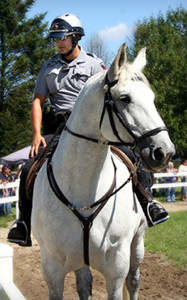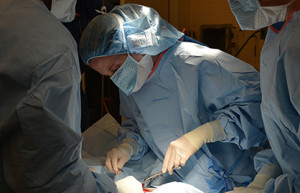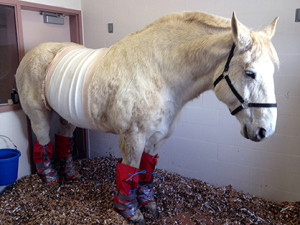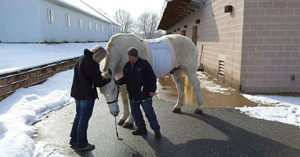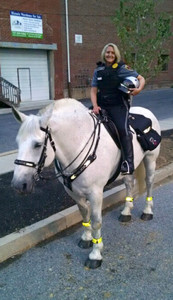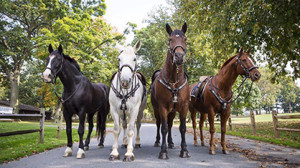Colic 911- Repeat Colic Surgery
Colic 911- Police Horse Saved by Surgery at New Bolton Center
Penn Vet Extra by: Louisa Shepard
Duke, the longest-serving equine officer in the Lancaster City Police Mounted Unit, was off his feed one day in early February, rolling on the snowy ground, and biting at his side.
Colic.
The most common reason horses require emergency veterinary care is colic, the general term for abdominal pain. Colic is considered the number-one killer of horses.
The classic signs are familiar to the team caring for Duke, a 17-year-old white Percheron. The gelding had colic in 2009 and was successfully treated with surgery at New Bolton Center. He had been colic-free, until February 4.
Duke’s primary veterinarian, Dr. John Kreider, treated him with mineral oil and medication, but the signs persisted. So the officers loaded Duke onto the trailer and brought him back to New Bolton Center.
“I didn’t want to wait too long to go down to New Bolton Center and then have it be too late,” said Officer Scott McDonald, one of Duke’s primary riders on the mounted patrol.
“We left right around 5 pm, such a bad time to go with traffic, but we were lucky and hit every green light on way down,” he continued. “We brought him in to New Bolton Center and five people swarmed in and checked him.”
Dr. Louise Southwood, an Emergency and Critical Care clinician and surgeon who specializes in colic surgery, was ready with her team, including surgery resident, Dr. Hope Douglas.
“His colon was twisted, which was causing his pain. But it was not a typical twist, so the blood supply was not completely cut off, which was good for Duke,” Southwood said. “We got him to surgery quickly and untwisted it. He would have died without surgery.”
Time was a critical factor, she said. Since the officers brought Duke to New Bolton quickly, the colon was otherwise healthy and no necrotic tissue had to be removed.
2,000-Plus Pounds
Colic surgery on a draft horse poses particular challenges. The operating room needs a strong hoist high enough to handle the 2,000-plus-pound weight. The hoist and rail system in New Bolton Center’s orthopedic surgery suite is 18 feet high, allowing for clearance above the tables when a horse is lifted and moved to a recovery stall.
“We can handle draft horses,” Southwood said.
For the surgeon, physically reaching in and managing such a large, long colon takes experience and expertise. “I could barely reach because it was so deep in there,” Southwood said. “My arms are only so long.”
Time on the table is important and the surgeon has to move quickly, as draft horses typically struggle to stand up after anesthesia because of their size.
Careful monitoring of oxygenation and blood pressure is especially important in these large horses, said Dr. Kim Olson, New Bolton Center Anesthesiologist, as well as working to avoid complications such as nerve or muscle damage from being down too long.
Getting the horse to stand safely is critical, and the hoist system at New Bolton Center is key to success with some draft horses, she said.
A Smooth Recovery
Duke had a remarkably easy recovery from anesthesia, his clinicians said, and did not need the hoist to stand.
“His recovery could not have been better,” Olson said. “He’s older but in good, athletic physical condition. He didn’t seem to have any trouble getting up on his feet by himself.”
Duke continued to recover and “did really well” in the days after surgery, Southwood said. Duke was cared for in New Bolton Center’s biosecure facility dedicated to colic patients, the Moran Critical Care Center.
“People think colic is a death sentence, and it is not,” Southwood said. “Duke had colic surgery seven years ago and has done great, and he has come through and recovered from this surgery as well.”
Duke was discharged on February 10, and was welcomed back by his equine colleagues. “The horses came running over to meet him at the gate,” McDonald said. “We changed his dressing, and his incision looks excellent.”
After four weeks of stall rest and hand walking, Duke should be able to be turned out in a small paddock, and then graduate to a larger paddock. If all goes well, they expect Duke to return to active duty in about three months.
Duke the Alpha
Duke was three years old, working as an Amish plow horse in Toronto, Canada, when the Lancaster Police purchased him in 2002. He started working the street beat the next year. Back then he was all black, but over the years has gone from a dapple grey to totally white.
“He is the alpha male of our herd,” said Officer McDonald, with affection. “He’s definitely the boss of the other horses out there.”
Duke’s full-time rider retired in 2010, and since then several officers ride him, primarily McDonald. “Duke and I have a special relationship,” he said.
“He is a push-button horse. If you have a good rider up there, he will do anything you ask him to,” McDonald said. “He’s the horse we use to train other horses and riders. When we take them out on the street, we will take them with Duke.”
Another Lancaster officer who rides Duke, Detective Lieutenant Sonja Stebbins, said Duke is a “gentle giant” she trusts. “He’s great with people at family-friendly events like parades, but then when on patrol, or asked to move a crowd of angry protesters, he is a horse that stands firm. You can count on him always.”
The other equine officers in the unit are Liam, Ozzy, and Charlie. Liam has also been a patient at New Bolton Center, successfully treated for lameness by arthroscopic surgery on his right hind fetlock in 2014.
The mounted unit in Lancaster was founded in 1979. The care and expenses for the four horses, and the K-9 unit’s dogs, are covered by the private Lancaster City Police Foundation.
Lancaster city is one of four mounted police units in Pennsylvania, along with Philadelphia, Bethlehem, and the State Police. The units partner for crowd control at large events. Both Duke and Liam worked the streets of Philadelphia during the recent visit by Pope Francis and also were at the G-20 international economic summit in Pittsburgh.
Their main job is to patrol the streets of Lancaster City, where they are beloved by the public. “Duke likes to go out on the street,” McDonald said. “Duke is great downtown and everybody knows him.”
Colic Basics
Gastrointestinal problems are the most common cause of colic in horses. Second to gas colic, the most common cause of colic is large colon impaction, which most often occurs at the pelvic flexure. Fewer than five percent of horses with colic require surgical correction. The majority of horses with colic recover with minimal to no treatment.
The specific signs associated with colic include:
- pawing at the ground
- flank watching
- kicking at the abdomen
- stretching
- rolling
- distended abdominal area
- sweating
- lack of defecation
- lack of appetite










